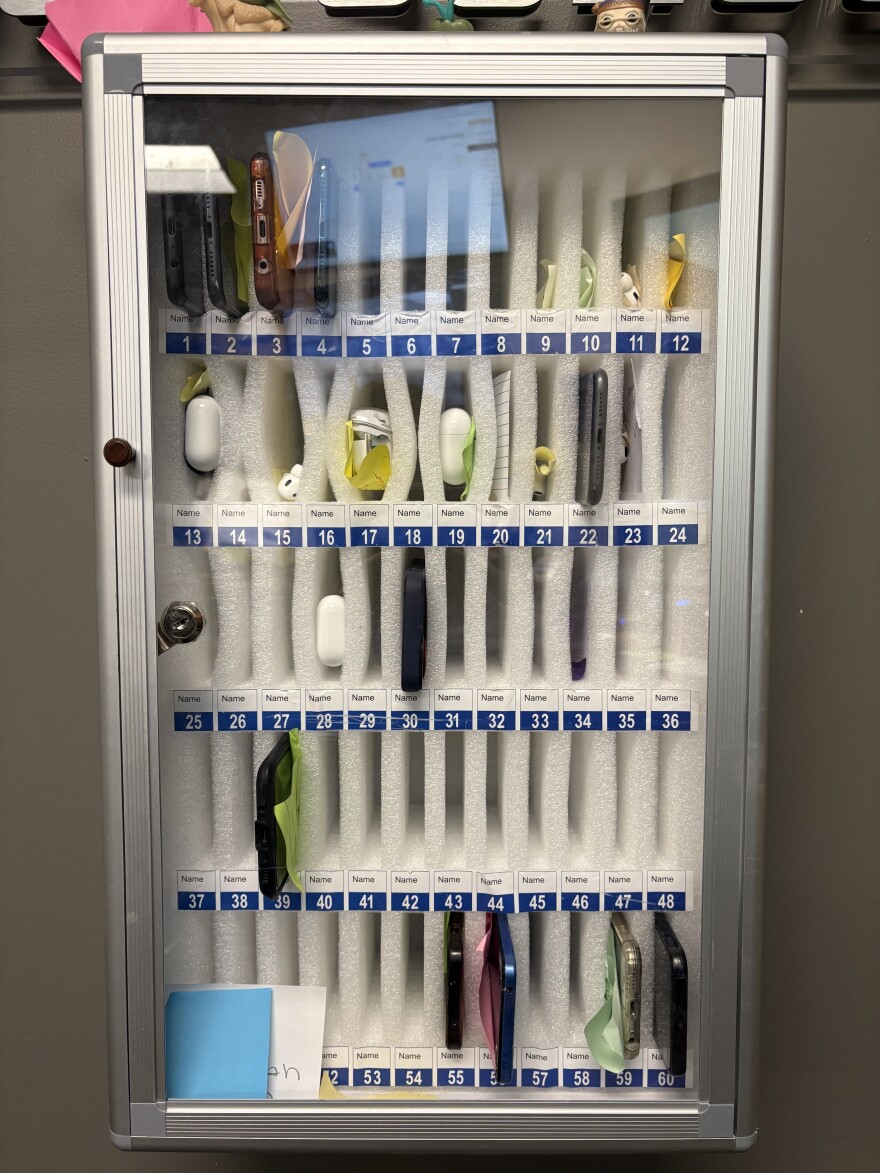During lunchtime at Centaurus High School in Boulder County, students lean against lockers, eating hot dogs and reading books. In the crowded cafeteria, they talk to each other while they eat.
“It's loud again. You know, it used to be quiet and people were on their devices,” said Jeff Jackson, a social studies teacher. “There's still some on their computers and they're doing work, or they're maybe watching highlights from the Nuggets game or something, but they're doing it together.“
Get top headlines and KUNC reporting directly to your mailbox each week when you subscribe to In The NoCo.
Faced with a deluge of screens, watches and earbuds, school districts across Colorado are updating their policies to ban phones for all or part of the school day.
This year, Summit High School in Breckenridge, required that students store their phones in lockable pouches. For the upcoming academic year, high schoolers in Poudre School District will be allowed access to their phones at lunch and passing periods but not in class.
In January, Boulder Valley School District, which includes Centaurus, implemented a new policy: in high schools, phones are no longer allowed.
Wyatt Chapman, a senior, thought that banning devices during class made sense but felt the proposed changes were “extreme.”

“I thought, ‘Well what am I gonna do, how am I gonna coordinate with my friends for lunch and stuff like that?’” said Chapman.
He worried about animosity between students and staff, who would be responsible for enforcing the new policy by taking away phones. Chapman spoke at a board of education meeting, expressing these concerns.
But now that phones must be put away, the teen and his friends have a set meeting place for lunch.
“And then, with the off periods and stuff, first of all, I’ve done more homework. And also, just, there are other ways to keep yourself entertained,” Chapman said.
In hallways, a few students lean over their phones, hiding while they scroll. But most don’t. In total, staff confiscate fewer than 20 phones a day.
“It's not perfect, but this is so much better than where we've been,” Jackson said.
‘We have a mental health crisis’
Administrators cite bullying, mental health and distraction as major issues they needed to address. Some reference The Anxious Generation, the new and wildly popular book about the negative impacts of social media on kids.
“I don't want to make it sound like we had a five-alarm fire at the other side, but we had some issues around this. We have a mental health crisis, and we weren't linking the two together,” said Carlyn Carroll, principal of Centaurus High School.
In a 2023 survey, 1 out of 4 Colorado high school students reported feeling sad and hopeless. For 1 in 5, their stress felt unmanageable most days.

Last summer, administrators at Summit High School gathered feedback about phone access. Parents were concerned about mental health and bullying. Students were too.
“They were reporting that they're tired of being bullied and harassed online,” Dave DeRose, an assistant principal, said. ”We had instances of kids going on Instagram Live during the school day, talking about other kids, with 80 viewers. So none of those kids are learning, right?”
Feedback on phone use from many teachers, was stark: Kiersten Macreery, a history teacher at Summit High School, described it as “awful” and “constant.”
“In the past years, you could see they [students] would hurry through the tests so that when the test was over, they could get their phone,” Macreery said.
Myles Stolier, another teacher, described physical aggression from students when he tried to control phone use during prior school years.

“And last year, mid-year, I was like, ‘This is not worth it.’ Constantly battling with students. Students don't talk to each other, the distractions, the addiction, the depressive nature of a classroom,” said Stolier. “I was ready to move on.”
State data shows a majority of teens spend at least three hours a day on screens, for something other than school work. National reports suggest that 1 in 3 use social media almost constantly.
“When I had my phone, like, with my social media and everything, and it was constantly just, ring, ring, ring, like, gotta check it. What's going on? Someone's texting me right now,” 16-year-old Jada Leaks said.
This year, with new phone restrictions in place, behavior and attention have improved. Stolier said class time is going “much more smoothly.” He no longer wants to leave teaching.
“Now, students are taking two to three times as long, same type of questions, but instead of one-word answers, they're full sentences. It's been, it's been amazing,” said Macreery of testing.
'They have jobs and a life outside of school’
Students at Summit High School describe relief as well. But losing access has come with downsides: Having trouble coordinating with work, for example.
“Which actually happened to me once, trying to get an application through to a job, and I missed so many calls,” said Leaks.
Other students describe missing texts about after-school sports and having to go into the bathroom to submit college financial aid forms from their phone.
“I just think that there's a lot of situations that would happen where you do need your phone, especially in a high school setting, where it's like, you have young adults, they have jobs and a life outside of school.” Leaks said.

At Summit High School, students are supposed to store their devices in a Yondr pouch, a small lockable sleeve.
Students and staff acknowledge these pouches aren’t used consistently. DeRose described students stuffing them with cardboard or old phones. Still, devices are mostly put away.
“Generally, students are following the essence, but maybe not the substance, of the policy,” said DeRose.
This rule change has been a massive lift. Staff have confiscated phones more than 800 times and have met with many parents whose kids are unable to stop using them.
But, DeRose says it has been worth the effort. The main atrium of the high school now hosts ping pong, foosball, and cornhole; this is what students asked for in place of phones.
“I can tell you the best part of my day is lunch, just seeing kids talk and play foosball and ping pong again," DeRose said. "And that was the intention, to create those organic conversation spaces.”







